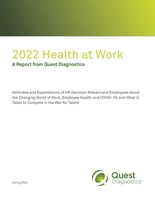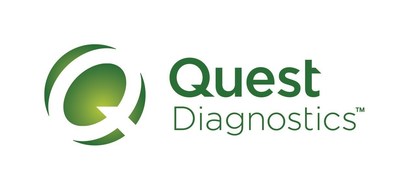Survey of Human Resource Executives and Office Workers Suggests Employee Health May be a Key Ingredient to Addressing the "Great Resignation"
"2022 Health at Work" report from Quest Diagnostics reveals the attitudes and expectations of HR executive decision makers (HREs) and employees about the changing world of work, employee health and COVID-19, and what it takes to compete for today's scarcest resource–people
SECAUCUS, N.J., May 9, 2022 /PRNewswire/ -- As millions of U.S. employees voluntarily resign and employers desperately scramble to find workers, a new survey suggests employee health strategy may be a key ingredient to keeping employees well and at work. Among employees thinking about changing jobs, better benefits in general (
"2022 Health at Work," a report from Quest Diagnostics (NYSE: DGX), sheds light into the unprecedented employer-employee dynamics taking shape in a competitive labor market—and the unique challenges employers face to deliver quality, cost-effective health benefits that meet the heightened demands of workers. The report is unique for engaging both employers and employees to uncover points of agreement and disconnect, based on a survey of 423 human resources benefits managers and executives with decision-making authority (HREs) and 846 office workers (employees) at companies with 100 workers or more.
Among the findings: Two-thirds of employees (
"While there has been significant attention on low pay, lack of flexibility, and disrespect at work as main reasons driving the 'Great Resignation,' our findings suggest employee health programs play a major role as well," said Jay G. Wohlgemuth, M.D., Senior Vice President, R&D and Medical, and Chief Medical Officer. "Employers are taking extraordinary measures to attract and retain talent, and healthcare benefits, access and affordability are areas of focus they can't afford to overlook to compete for workers."
Health Insurance: Who Should Pay the High Costs?
Among the key findings, there was strong agreement--
Chronic Conditions Now Rival COVID-19 as a Top Concern
Throughout the worst of the pandemic, more than half (
The concerns appear warranted: Three in five (
Other research, including Health Trends® studies by Quest Diagnostics, reveal declines in rates of new cancer diagnoses and other diseases during much of the pandemic, likely due to delayed medical care. Early detection and treatment of many chronic illnesses, including cancer, diabetes and heart disease, is associated with improved health outcomes.
The report also suggests that employers are increasingly prioritizing mental health, with
"Our report highlights the strategic importance of employer-based healthcare strategies that deliver comprehensive mental and physical health benefits," said Cecilia K. McKenney, Senior Vice President and Chief Human Resources Officer, Quest Diagnostics. "Many colleagues are struggling amid the unprecedented healthcare and economic crises caused by COVID-19. By promoting access to interventions that improve mental health, employers not only help at-risk colleagues navigate challenging personal and socioeconomic dynamics—they also elevate their organizations as employers-of-choice."
Health Screening Programs are Essential to Being an Employer of Choice, Despite Some Doubts About Cost Savings
Employee health screening is seen as a must-have benefit to be an employer of choice, even by those who question its ability to lower medical costs. Ninety percent of HREs and
The survey findings also suggest that at-home screenings and telehealth can expand access to healthcare. Eighty-seven percent of both groups are comfortable with at-home biometric testing, and
Despite largely favorable perspectives of employer-based health services, more than half of employees (
About Quest Diagnostics
Quest Diagnostics empowers people to take action to improve health outcomes. Derived from the world's largest database of clinical lab results, our diagnostic insights reveal new avenues to identify and treat disease, inspire healthy behaviors, and improve health care management. Quest annually serves one in three adult Americans and half the physicians and hospitals in the United States, and our nearly 50,000 employees understand that, in the right hands and with the right context, our diagnostic insights can inspire actions that transform lives.
Through its employee population health services, Quest Diagnostics is the leading provider of services that help organizations improve health outcomes and lower medical costs for employers and their employees. The company's data-driven population management services, based on its laboratory and biometric screening services, provide insights for identifying individuals at-risk for chronic diseases and other medical conditions. Once identified, the company also provides access to interventions to inspire behavioral and other changes leading to better outcomes across the continuum of care.
www.QuestDiagnostics.com and www.QuestDiagnostics.com/EmployerPopulationHealth
![]() View original content to download multimedia:https://www.prnewswire.com/news-releases/survey-of-human-resource-executives-and-office-workers-suggests-employee-health-may-be-a-key-ingredient-to-addressing-the-great-resignation-301542058.html
View original content to download multimedia:https://www.prnewswire.com/news-releases/survey-of-human-resource-executives-and-office-workers-suggests-employee-health-may-be-a-key-ingredient-to-addressing-the-great-resignation-301542058.html
SOURCE Quest Diagnostics









